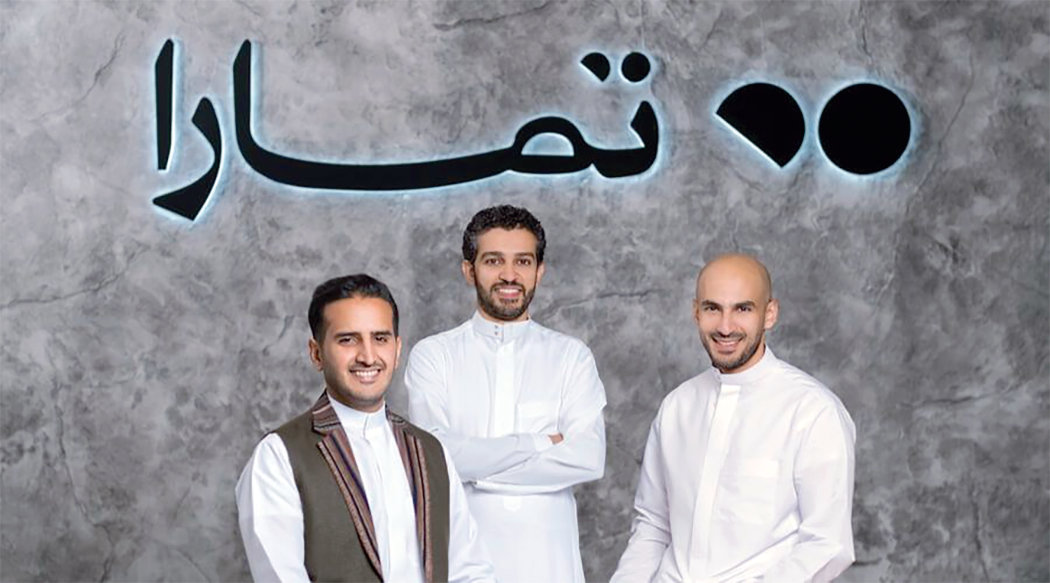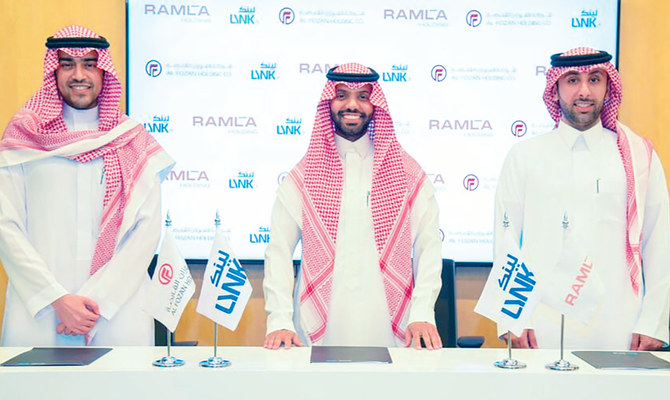CAIRO: Startups across the Middle East and North Africa region managed to raise significant funding rounds, hailing a rebound in the venture capital space.
Saudi Arabia’s fintech sector marked a significant stride with LYNK successfully securing an investment round.
This financial boost came from notable backers Al Fozan Holding and Ramla Holding Group, although the investment amount remains undisclosed.
Founded in 2023 by Thabet Al-Subaie, LYNK connects financial institutions, commodity markets, and beneficiaries through its Shariah-compliant services.
This latest infusion of funds is set to catalyze the company’s growth, facilitating the introduction of new financial products and expanding its footprint both locally and globally. “LYNK is considered a leading company in the fintech industry. LYNK is dedicated to expanding its scope of work and strengthening its position among prominent financial institutions by establishing strategic partnerships aimed at meeting the aspirations of customers and fulfilling market needs,” Al-Subaie said.
Since its launch by BIM Ventures’ Saudi Venture Studio, LYNK has demonstrated remarkable performance in automating financial transactions. The platform has efficiently processed over SR100 million ($26 million) in Murabaha transactions.
The company claims to handle up to 15,000 transactions daily, each executed in less than a minute, and collectively valued at over SR5 billion.
Saudi BNPL Tamara raises $250m in debt financing
Saudi Arabia’s buy now, pay later giant Tamara managed to secure an additional $250 million in debt financing, bringing its total facility to $400 million.
The investment consists of an up to $200 million senior debt contribution from Goldman Sachs, complemented by a $50 million tranche by Shorooq Partners.
Co-founded in 2020 by Abdulmajeed Al-Sukhan, Turki bin Zarah, and Abdulmohsen Al-Babtain, Tamara’s offers its consumers the opportunity to purchase products in installments.
Last March, the company successfully raised a $150 million debt financing round, also from Goldman Sachs. This consistent backing from prominent financial institutions underscores Tamara’s growing influence in the fintech sector.

Co-founded in 2020 by Abdulmajeed Al-Sukhan, Turki bin Zarah, and Abdulmohsen Al-Babtain, Tamara’s offers its consumers the opportunity to purchase products in installments. (Supplied)
“We are pleased to announce this significant debt financing, a testament to our excellent operational performance to date and our future growth outlook,” Stefan Marciniak, Tamara’s chief financial officer, said.
“In a challenging economic climate, we are grateful to Goldman Sachs and Shorooq Partners for their support. These funds will catapult us forward, enabling us to further develop our flagship BNPL product and invest in new, innovative products and services, which will further strengthen our position as a leader in the industry,” Marciniak added.
The strategic utilization of this new financing is set to catalyze Tamara’s expansion. With its capital, the company is poised to invest in developing new products and services, further cementing its position in the competitive BNPL market.
Saudi Arabia’s VMS invests in Egypt’s Akhdar
Egyptian educational technology company Akhdar has successfully completed a six-figure funding round, led by Saudi Arabia’s venture studio, Value Maker Studio. This strategic investment is aimed at bolstering Akhdar’s expansion efforts into the Saudi market.
Established in 2016 by Mohamed Osama and Shady Ahmed, Akhdar has carved a niche in the education technology space by providing a wide array of Arabic-language educational materials.
Their offerings encompass over 2,500 pieces of content, including audio and written books, comprehensive book reviews, and engaging podcasts.
This diverse range of educational resources caters to a vast audience, with the app being utilized by 1.5 million users across 174 countries globally.
The recent funding underscores the growing interest in edtech solutions and reflects the confidence of investors in Akhdar’s potential for growth and impact.
“This strategic partnership will greatly support our expansion plans into the Gulf Cooperation Council region, with a particular emphasis on Saudi Arabia. Additionally, it will enable us to fuel our growth and further enhance our technology to effectively address the challenges faced by today’s learners,” Osama said.
This investment acts as a stepping stone for Akhdar to strengthen its presence in the Middle East, starting with Saudi Arabia.
Saudi cybersecurity startup COGNNA raises $2.25m
Saudi Arabian cybersecurity startup COGNNA has successfully secured $2.25 million in a seed funding round led by IMPACT46 and saw contributions from Vision Ventures, Faith Capital, along with other investors.
Established in 2022 by Ibrahim Al-Shamrani and Ziyad Al-Shehri, COGNNA specializes in leveraging artificial intelligence and sophisticated data analysis to identify and neutralize threats in customers’ systems and networks.
Notably, COGNNA was part of the first-ever Cybersecurity Accelerator Program initiated by the Saudi National Cybersecurity Authority in August 2022, underlining its commitment to advancing cybersecurity solutions.
UAE’s fintech startup Mafhoom Technologies raises $1.36m
Mafhoom Technologies, a UAE-based fintech startup, has successfully raised $1.36 million in a pre-seed funding round by Al-Wafra Al-Thanya for Investments, complemented by contributions from various angel investors.
Established in 2022 by founders Ahmad Khatib and Ziad Melhem, Mafhoom is designed to empower users to manage their finances more effectively.
It offers tools to optimize spending, reduce bills, clear debt, and enhance financial literacy, while also helping users to meet their saving and investment goals.

This strategic partnership will greatly support our expansion plans into the Gulf Cooperation Council region, with a particular emphasis on Saudi Arabia.
Mohamed Osama Akhdar, cofounder and CEO
“Mafhoom Technologies is at the forefront of financial innovation, and we are delighted to have the support of esteemed investors who share our vision for a financially empowered future,” said Khatib.
This fresh injection of capital will enable Mafhoom to expand its team and facilitate its growth plans in Saudi Arabia.
Morocco’s CloudFret raises $2.1m
CloudFret, a Morocco-based logistics startup, has successfully raised $2.1 million in a funding round jointly led by AfriMobility and Azur Innovation Fund.
Launched in 2021 by Driss Jabar, CloudFret leverages an AI algorithm-based platform to facilitate connections between shippers and carriers across Mediterranean shores.
With this new capital, CloudFret aims to significantly expand its operations. The company has set ambitious targets to double its workforce by the end of 2024, a move that is poised to enhance its service offerings and broaden its network of shippers and partner carriers.
UAE’s logistics startup Wize raises $16m
Wize, a UAE-based logistics startup, has successfully secured $16 million in a pre-seed funding round predominantly backed by angel investors.
Established in 2022 by Alexander Lemzakov, Wize is carving a niche in the logistics sector with its eco-friendly last-mile transportation solutions.
The company operates on two primary fronts, firstly, as a marketplace for electric motorcycles, and secondly, as a subscription platform that enables businesses to efficiently manage their own fleets.
In a bid to support sustainable transportation, Wize offers a unique battery-as-a-service model, along with swapping stations.
Additionally, it has developed the Battery Swap App, designed to aid drivers in locating and reserving batteries, while also keeping them updated on charge levels.
With the injection of this new capital, Wize is set to accelerate its product development initiatives.
The funding will also facilitate the company’s expansion within the UAE, and enable it to explore and establish new partnership opportunities across the broader MENA region.
























